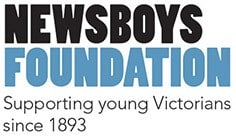The excitement radiates out of Western Edge’s Penny Harpham.
“Melbourne’s west is one of the most multicultural places in the country,” she says. “It has the fastest growing rate of young people in the country, so for us it’s a really exciting place to be as an arts organisation. Somewhere where we can really understand and hear the stories from young people from all sorts of different intersections; cultural, economic, sexual, gender-diverse. We cover a really broad range of young people coming into our rooms.”
Established in 2005, Western Edge Youth Arts (or ‘WEYA’) provides a place for the melting pot of western Melbourne young people to come together to create art, express themselves and have a genuine voice. The not for profit organisation’s work ranges from school programs (‘We have ways of making school cool,” she laughs) and workshops, community programs and performances to development paths for aspiring performing arts professionals. Participants are invited into the community programs from around 14 years old.
The most striking aspect of the company is its passion and commitment to letting the young participants have a genuine voice in the direction and priorities of the work.
“Everything we do is co-designed,” Penny said. She holds workshops to ask the young artists what they want, about their ambitions, how WEYA can help, what could be done better? It’s not just lip service.
“From all of that, we know what sort of grants to apply for or what organisations to align ourselves with. It helps keep us really focused not on what the adults in the company want but what the young people in the west are saying and that changes all the time too, so it’s about being responsive to the changing needs of the young people.”
Penny is about to move into the role of Executive Director, having been the Co-Artistic Director and CEO, alongside Tariro Mavondo, who after two years of securing WEYA’s future is ready for a new chapter overseas. Penny admits WEYA’s Covid-affected 2021 might have even been harder than the first year of pandemic life. Like most companies, WEYA had pivoted in 2020 to move its work online, training lead artists and supporting artists in online child safety, and other necessities, while inventing new online streams of creativity from anthology writing to iPhone film making, animation and home-based activities.
But in 2021, the energy started to fade across the community and WEYA felt it too. Programs had to adapt for waning attention spans and motivation. Penny said, “The aim this year became not so much to have outcomes, it was to keep people connected, and if that meant a 10-week program got changed into three half-day online parties, that’s what we changed it to.”
The Newsboys Foundation played a major role in Penny being able to act on the changing lockdown landscape of her cohort by diverting funds into training and other work to make sure the company’s artists and participants felt safe, supported, and upskilled.
Behind the scenes, the Newsboys Foundation was also quietly helping Western edge transform into a more robust, mature, structured entity, capable of long-term survival, broader fund raising and sophisticated management. At one point, Newsboys’ support literally included putting a roof over Western Edge’s head after the organisation was forced to leave its previous base at short notice for the safety of participants and staff. WEYA moved into Newsboys’ South Melbourne office for six months before becoming resident company withing Newport’s Sub-Station development. A priority is for Penny to find a permanent home in the west for the company.
The time in the Newsboys office led to other connections that WEYA might not have otherwise discovered. Newsboys CEO Sandy Shaw introduced Penny to Social Venture Partners Melbourne, and she was invited to apply for SVP assistance. “I’ve been an artist my whole life and this is the first job I’ve had where I’m in an office,” she reflected. “SVP are really helping us manage our core team, and they’re helping come up with ways to create a really sustainable business plan and strategy. They’re helping us with our governance, management, business; helping us dream bigger and have big clear achievable steps so we can achieve them.”
And what are those steps? Penny is adamant that she only needs to listen to Western Edge’s community to find out. “It’s not even about empowering young people, because they already have power actually,” she said. “They know who they are, they know what they’re doing, they know what’s cool, or not. They know when people are talking down to them or a situation is unsafe; that’s actually very clear. What they need is for organisations or structures around them to be safe, and to listen to what they want and with that information, go about partnering up with others, creating plans around them to actually make it happen. We’ve worked hard to get away from language like ‘vulnerable’ because a lot of the young people we work with are powerful and they kind of just need people to step back a bit and let them talk.
“They are the future, they know it, they are the future of art in this country. It always comes from young people, it always comes from the new wave coming through, and I think Melbourne’s west [SS1] is the most exciting place to be looking for future artists, whether that be writers, directors, actors, administrators, leaders, advocates.
“They know how speak truth to power really clearly, and creatively. I learn so much every day just from sitting in a room with them and asking them: ‘What’s up?’”
Nick Place 2021

